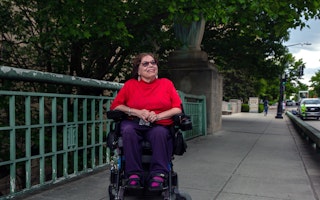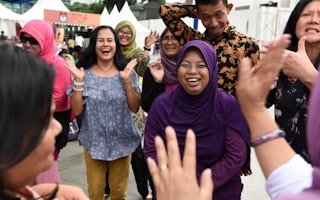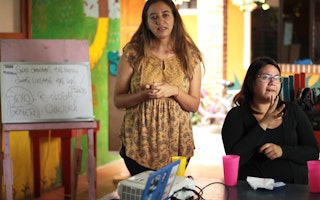Disability Rights Are Human Rights
By Theresia Degener

When I was young, German law prohibited children with disabilities from attending regular schools. However my father, who was the only doctor in the village, petitioned the headmaster and told him that he would not treat the headmaster’s children if I was unable to attend the regular school.
The headmaster said this was illegal and that he would call the police. My father unflinchingly told him to call them. I was impressed that my father was willing to go to jail so that I could attend a regular school. It was this moment that made me realize that I wanted to repeal the discriminatory laws that prohibited me from attending school.
As an adult, in 1981, I organized a protest against the German government. That year the government was celebrating its “achievements” in disability rights through its International Year of Persons with Disabilities. We set up a “cripple tribunal” to publicly accuse the government of violating the rights of persons with disabilities. We called ourselves “crippled” because that is how we felt the government had treated us.
When I first began working in the disability rights movement, I didn’t believe in human rights. As a lawyer, I believed that the human rights field consisted of weak laws that couldn’t be enforced.
It was not until I began working with the Human Rights Commission and advocates from Amnesty International and Human Rights Watch that I began to believe in the power of human rights. It took me a while to understand that these rights are important because they go beyond nationality, cultural limits, or religion to find common ground in the international arena. The right to be recognized as a person before the law is one of the basic and fundamental human rights. Prior to the 2006 adoption of the Convention on the Rights of Persons with Disabilities (CRPD), persons with disabilities were denied this right.
The Convention is not about inventing new human rights. It is important that disability rights are mainstreamed in the general human rights movement and that the catalog of rights enshrined in the Universal Declaration of Rights is tailored to include the context of disability.
Usually during human rights treaties negotiations, you have conflicts between different states or between governments and NGOs. But during the negotiations of the CRPD, you had disagreements among different disability organizations.
One big issue was the question of whether there should be a human right to segregated education. The deaf organizations demanded the right to separate schools for the deaf and hard of hearing so that they could succeed in an environment supportive of their needs and identity.
However, segregated education cannot be a human right since it is inherently unequal. The various disability organizations were able to resolve this tension in Article 24 of the CRPD, which states that every child has a right to inclusive education and includes specific paragraphs with regard to deaf and blind children.
The CRPD is one of the most modern, innovative human rights treaties. Yet its implementation is a larger struggle. The understanding of disability remains complicated even among states that have ratified the Convention.
Disability is a social construct, not a medical condition. A medical model of disability says that it is a problem that needs to be taken care of by doctors or rehabilitation experts. A human rights model says that we need to change policies and laws to be inclusive of persons with disabilities. For example, under the human rights model, laws which allow for legal incapacitation of disabled persons on the ground of mental cognitive impairment are a violation of rights because they deny these individuals the right to be recognized as a person before the law.
The implementation of human rights treaties has to be seen as a process, and this process should include many people and groups across society. It is not sufficient for only governments to affirm their commitment to disability rights.
We also need persons with disabilities and their organizations to understand why human rights are important for them and why they need to fight for their rights. Unless we are empowered to uphold our rights, human rights for persons with disabilities will not become a reality.
Theresia Degener is the chairperson of the UN Committee on the Rights of Persons with Disabilities and a professor of law and disability studies at the Protestant University of Applied Sciences in Bochum, Germany.


